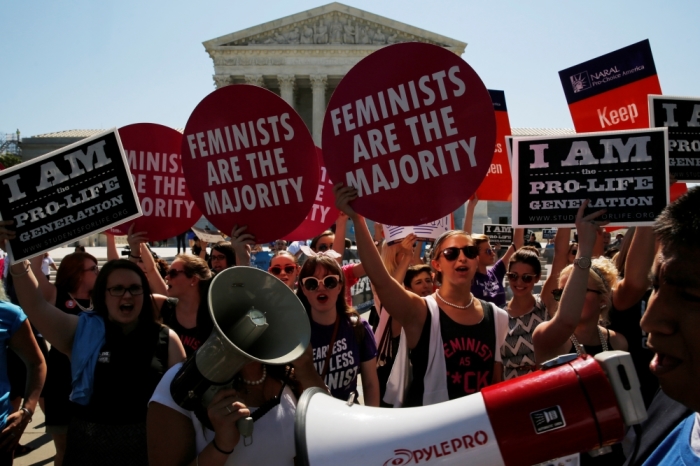Out-of-state travel for abortions doubled in last 3 years, report suggests

Interstate abortion travel has more than doubled from 2020 to 2023 as many states have implemented bans and restrictions on the procedure, a new report suggests.
The Guttmacher Institute, a pro-abortion research organization, released a report examining the magnitude of interstate abortion travel following the U.S. Supreme Court's June 2022 Dobbs v. Jackson Women's Health Organization decision. The Dobbs decision determined that the U.S. Constitution doesn't contain a right to abortion, overturning the Roe v. Wade ruling that legalized abortion nationwide.
The report, released Thursday, compared data on interstate abortion travel from 2020, before the Dobbs decision, to 2023, the first full year after the ruling. Following the Dobbs decision, several states implemented bans and restrictions on abortion.
The Guttmacher Institute's report found that 92,100 women traveled out of state to obtain an abortion in the first six months of 2023 compared to 40,600 in the first half of 2020.
According to the pro-life activist organization Susan B. Anthony Pro-Life America, 15 states have near-total abortion bans, two states prohibit abortion after six weeks gestation, two states ban abortion after 12 weeks, four states have strong pro-life protections in litigation while Florida bans abortion after 15 weeks gestation.
The Guttmacher Institute identified Illinois as the state that performed the highest number of abortions on women who do not live in the state, with 18,870 non-residents receiving abortions in the first half of the year.
The report attributed a large number of out-of-state abortions to the state's location adjacent to three states with near-total abortion bans: Indiana, Kentucky and Missouri.
The Guttmacher Institute lists Illinois as one of 17 states that protect a right to abortion before viability and one of 13 states with "shield" laws that limit "negative effects of out-of-state abortion restrictions and bans on abortion providers in the state."
New Mexico saw 8,230 women travel into the state to receive abortions in the first half of 2023. The report noted that the state borders two states with near-total abortion bans: Texas and Oklahoma.
Florida also attracted 5,780 out-of-state women seeking abortions in the first six months of 2023. The report contrasts abortion policy in Florida with that of other states in the South. Although Florida has a 15-week abortion ban on the books, Alabama, Arkansas, Louisiana and Mississippi have near-total abortion bans, while Georgia prohibits abortions after six weeks gestation.
A total of 3,990 women traveled to Colorado to obtain abortions in the first six months of 2023. The report cited the state's proximity to Oklahoma, which has a near-total abortion ban; Nebraska, which has a 12-week abortion ban; and Utah, where abortion is prohibited after 18 weeks gestation as stronger pro-life protections remain tied up in litigation, as the reason why the state has become an abortion destination.
Other states that performed a considerable number of abortions on women traveling from out-of-state in the first half of 2023 include North Carolina (8,920), Kansas (5,780), Maryland (4,400), Georgia (4,370), New York (3,700), California (3,630), New Jersey (3,040), South Carolina (2,490), Minnesota (2,420), Virginia (2,370), Ohio (1,610), Nevada (1,350), Michigan (1,270), Washington (1,210) and Pennsylvania (1,140).
"We knew that more people have been traveling across state lines for abortion since the end of Roe, but these findings are stunning nonetheless, and powerfully illustrate just how disruptive the overturning of Roe has been for tens of thousands of abortion patients," Guttmacher data scientist Isaac Maddow-Zimet said in a statement.
Maddow-Zimet, the project lead behind the latest research, added that "where people are traveling to get care is an important piece of the puzzle in untangling the post-Dobbs abortion landscape."
"Policies that protect and expand access, such as those that permit any qualified health provider — not just physicians — to offer abortion care or shield laws that protect providers from criminal investigation from hostile states, have been critical in helping states meet patients' needs," said Guttmacher Vice President for Public Policy Kelly Baden.
While several states have enacted abortion restrictions following the Dobbs decision, a handful of other states have gone in the opposite direction as voters have approved establishing constitutional rights to abortion. Last year, voters in California, Michigan and Vermont approved ballot questions enshrining a right to abortion in their respective state constitutions, while a similar initiative passed in Ohio earlier this year.
At the same time, voters rejected ballot measures that would have established pro-life protections in Kansas and Montana, while a measure that would have clarified that there was no state constitutional right to abortion failed to pass in Kentucky.
Ryan Foley is a reporter for The Christian Post. He can be reached at: [email protected]




























